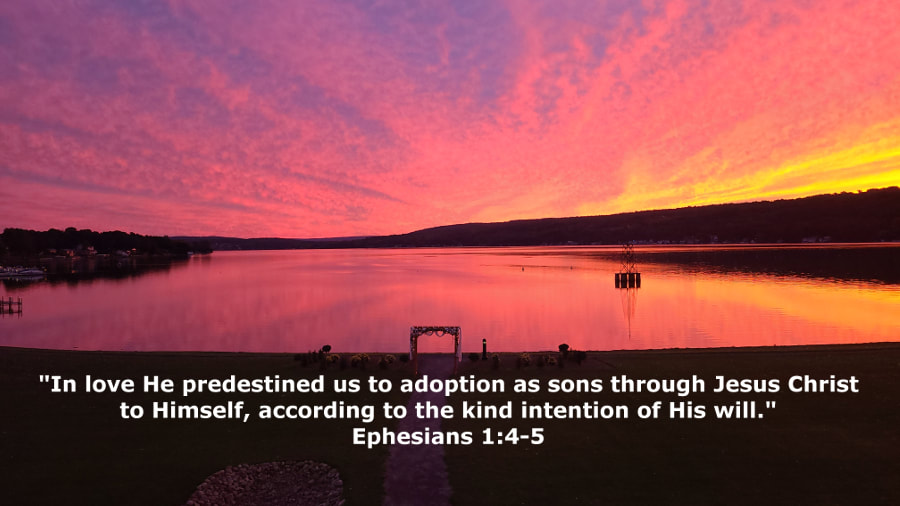Image source: Sweet Publishing / FreeBibleimages.org
"I know that the Lord has given you the land, and that the terror of you has fallen on us ... for the Lord your God, He is God in heaven above and on earth below." (Joshua 2:9-11 excerpts)
"By faith Rahab the harlot did not perish along with those who were disobedient, after she had welcomed the spies in peace." (Hebrews 11:31)
This lesson explains how Rahab of Jericho demonstrated courageous faith in the Lord God. Despite the idolatrous and sinful culture around her, she welcomed the two Israelite spies that Joshua sent, expressed her faith in the Lord to them, and followed their instructions resulting in her deliverance and the deliverance of her family from the destruction of Jericho.
Read. Please read the Bible story of Rahab, the two spies, Rahab's faith, and the deliverance of Rahab and her family in Joshua 2:1-21 and Joshua 6:15-25.
Consider. In what ways did Rahab demonstrate her courageous faith in the Lord by her actions and words?
The scripture quotations in this lesson are taken from the New American Standard Bible (NASB 1995 version) unless noted otherwise (Ref. 1).
1. Rahab's courageous faith in the LordRahab courageously chose to put her faith in the Lord God despite the "idol trusting" culture in which she lived
Rahab's choice to per her faith in the Lord resulted in her being protected and rescued through the coming destruction that the Lord was bringing upon sinful Jericho. Recall that God had instructed Moses and the Israelites to destroy the inhabitants of Canaan because of their sin (Exodus 23:22-24, 27; Deuteronomy 7:1-4, 18:9-13). The inhabitants of Jericho all had heard about the Lord's deliverance of the Israelites through the Red Sea about 40 years prior (Joshua 2:10, Exodus 14:21-22, Joshua 5:6). However, only Rahab turned to faith in the Lord God. Rahab courageously chose to put her faith in the Lord despite being surrounded by the culture of sin and "idol trusting" in which she lived.
Rahab not only turned to faith in the true God, but also put her faith into action. Rahab welcomed in peace the two spies that Joshua had sent (Joshua 2:1, Hebrews 11:31). She, at risk to herself, also hid the two spies from the king's men (Joshua 2:2-7). James, the writer of the epistle that bears his name, commended Rahab for advising the two men to hide in the "hill country" for three days to avoid capture instead of attempting to cross the Jordan and return to Joshua immediately (Joshua 2:16, Joshua 2:22-24, James 2:25-26). As a result of hearing about how the Lord "dried up the water" of the Red Sea before the Israelites, the hearts of Jericho's inhabitants "melted," and "no courage remained in any man" (Joshua 2:11). Even though the scriptures say "no courage remained in any man" [literal male individual] in Jericho, Rahab was a woman of courage, and she turned to the Lord in faith (Strong's Exhaustive Concordance - Ref. 2). Rahab said to the two Israelite spies, "I know that the Lord has given you the land" (Joshua 2:9), and, "the Lord your God, He is God in heaven above and on earth beneath" (Joshua 2:11). Rahab's faith also was commendable in her conversation with the two Israelite spies because she negotiated protection and deliverance not only for herself but also for her family. Rahab requested, "spare my father and my mother and my brothers and my sisters, with all who belong to them, and deliver our lives from death" (Joshua 2:13). On the day of Jericho's destruction, Joshua spared the lives of Rahab's entire family including her father and mother, her brothers and sisters, and all who belonged to them (Joshua 6:22-25). Rahab faithfully accepted and executed the three conditions set by the two spies: a. Condition 1 - That she tie "this cord of scarlet thread" in the window through which she had let them down (Joshua 2:15, 2:18, 2:21). For more information about the literal and symbolic meaning of indelible scarlet dye, check the lesson, "Come Now, Let Us Reason Together (Isaiah 1:18)" (Ref. 3). b. Condition 2 - That she would gather to herself into her house her father and mother and her brothers and her sisters and all her father's household (Joshua 2:12-13, 2:18, 6:22-23). c. Condition 3 - That she would not tell [inform] this business of the two spies (Joshua 2:14, 2:20, Brown-Driver-Briggs Ref. 4). 2. The rest of the Rahab Bible storya. Rahab is in the ancestral lineage of Christ
The rest of the Bible story about Rahab has a very good outcome for Rahab. After Rahab's deliverance from the destruction of Jericho, the Bible tells us that Rahab, a Gentile believer in the Lord God, "lived in the midst of Israel" (Joshua 6:25). The Bible does not mention Rahab's marriage to Salmon of the tribe of Judah. However, the Bible does say that Salmon and Rahab became the parents of Boaz (Matthew 1:5, Ruth 2:1). Subsequently, Rahab became the great-great-grandmother of king David (Ruth 4:21-22, Matthew 1:3-6). The Bible refers to our Savior, Jesus Christ, both as the Son of God (Luke 1:34-35) and as the son of David (Matthew 1:1). Since Rahab is in the ancestral lineage of king David, she also is in the ancestral lineage of our Savior, Jesus Christ.
b. Rahab is in the faith "Hall of Fame" (Hebrews 11)
"By faith Rahab the harlot did not perish along with those who were disobedient, after she had welcomed the spies in peace" (Hebrews 11:31).
In Hebrews chapter 11, the author includes Rahab in the honorable list of people who exemplified great faith. Rahab's inclusion in Hebrews 11 is exceptional in that she is only one of two women mentioned by name in this chapter along with the patriarchs, judges, and prophets that are included. Hebrews 11:11 describes Sarah.
In the Greek in Hebrews 11:31, there is an interesting contrast in the words translated as "faith" and "disobedient." (1). "By faith Rahab"
The Greek word translated as "faith" in Hebrews 11:31 is pistis (pronounced pis'-tis). We think of faith as believing in, trusting in, having confidence in (Strong's Concordance - Ref. 5). However, digging deeper, we see that the root meaning of faith is to be persuaded (HELPs Word-studies - Ref. 5). Rahab was persuaded that the Lord was the true God (Joshua 2:11), and by courageously trusting in him instead of the local idols she and her family were delivered through the destruction of Jericho. See Hebrews 11:6, "And without faith it is impossible to please Him, for he who comes to God must believe that He is and that He is a rewarder of those who seek Him."
(2). "Those who were disobedient"
And now, the surprise. The Greek word for "disobedient" in Hebrews 11:31 is apeitheó [pronounced ap-i-theh'-o] and means refuse to be persuaded (HELPS Word-studies - Ref. 6). Rahab had faith (she was persuaded that the Lord "He is God" - Joshua 2:11), and she was rescued from the destruction of Jericho. Other than Rahab's family, the other residents of Jericho refused to be persuaded about (believe in) God, and they perished (Hebrews 11:31).
Apply. Are you persuaded that "God is" and that he is a rewarder of those who seek him? (Hebrews 11:6). Turn away from trusting any idols in your life (religious idols or secular idols such as money). Put your faith and trust completely in the Lord God and his Son, Jesus Christ, the Messiah (Exodus 20:3, Matthew 6:24).
"And there is salvation in no one else; for there is no other name under heaven that has been given among men by which we must be saved" (Acts 4:12).
Related Lessons
"Come Now, Let Us Reason Together (Isaiah 1:18)" This lesson explains the meaning of "scarlet." Rahab tied a cord of scarlet thread in the window (Joshua 2:18). "Faith Comes from Hearing" - Romans 10:17
References
1. https://www.biblegateway.com/versions/New-American-Standard-Bible-NASB1995/ 2. https://biblehub.com/hebrew/376.htm 3. https://www.scriptureway.com/home/come-now-let-us-reason-together-isaiah-118 4. https://biblehub.com/hebrew/5046.htm 5. https://biblehub.com/greek/4102.htm 6. https://biblehub.com/greek/544.htm
0 Comments
"He chose us in Him before the foundation of the world, that we would be holy and blameless before Him. In love He predestined us to adoption as sons through Jesus Christ to Himself, according to the kind intention of His will." (Ephesians 1:4-5)
"For you are all sons of God through faith in Christ Jesus." (Galatians 3:26) "For you did not receive the spirit of bondage again to fear, but you received the Spirit of adoption by whom we cry out, 'Abba, Father.'" (Romans 8:15)
This lesson is written for people who already are believers in Jesus Christ. This lesson teaches 1) Before the foundation of the world, God planned to adopt us as his sons (children), 2) We become God's adopted sons through faith in Jesus Christ, and 3) God has given believers in his Son the Spirit of adoption, not a spirit of bondage.
Consider. Do you believe that God has adopted you as his child?
1. Before the foundation of the world, God planned to adopt us as his sons (children)
In Ephesians 1:1, Paul writes, "Paul, an apostle of Christ Jesus by the will of God, to the saints who are at Ephesus and who are faithful in Christ Jesus." Paul is writing not to unbelievers but to believers in Jesus Christ.
Paul then writes, "Blessed be the God and Father of our Lord Jesus Christ, who has blessed us with every spiritual blessing in the heavenly places in Christ, just as He chose us in Him before the foundation of the world, that we would be holy and blameless before Him. In love He predestined us to adoption as sons through Jesus Christ to Himself, according to the kind intention of His will" (Ephesians 1:3-5, italics added to the text for emphasis). God's plan to save us through His Son and to adopt us as his sons has been established since before the world began. The Greek word in Ephesians 1:5 for adoption is huiothesia (pronounced hwee-oth-es-ee'-ah), which means literally to place as a son (Ref. 1). Thayer's Greek Lexicon further describes the meaning of the word adoption: "the nature and condition of the true disciples of Christ, who by receiving the Spirit of God into their souls become the sons of God" (Ref. 1). Because of God's kind will and advanced planning, God has adopted us -- believers in Jesus Christ -- as his sons. 2. We become God's adopted children through faith in Jesus Christ
In Galatians 3:26, Paul writes, "For you are all sons of God through faith in Christ Jesus." Note that Paul is writing to all the believers comprising the churches in Galatia (Galatians 1:2).
There is only one criterion for becoming an adopted son (child) of God -- faith in Jesus Christ, the Son of God. Faith in Jesus Christ means belief, trust, and confidence in Jesus Christ (Strong's Concordance - Ref. 2). Faith is a gift from God, and is not something we earn through our own works (Ephesians 2:8-9). The phrase, "sons of God," in Galatians 3:26 is inclusive, not exclusive. In the New Testament, the phrase "sons of God" equally refers to male and female believers (HELPS Word-studies - Ref.3). The Greek word for sons in Galatians 3:26 means literally a son by birth or adoption and figuratively anyone sharing the same nature as their Father (Ref.3). God's adoption of us as his children through faith in Christ applies equally regardless of our ethnic or racial or national background, economic status, or sex. "There is neither Jew nor Greek, there is neither slave nor free man, there is neither male nor female; for you are all one in Christ Jesus" (Galatians 3:28). 3. God has given believers in his Son the Spirit of adoption, not the spirit of bondage
In Romans 8:15 Paul states that God has given us (believers in Christ) "the Spirit of adoption by whom we cry out, 'Abba, Father.'" First, the Holy Spirit is a gift by God to believers in Jesus Christ (Acts 2:28). Second, the Holy Spirit (the Spirit of adoption) brings us into a close, affectionate relationship with God as our heavenly Father where we like children call him "Abba," the equivalent of "Daddy" or "Papa" (Ref. 4).
The Spirit of adoption that we receive as God's adopted children is more pleasant than the spirit of bondage which is in the world. In Romans 8:15 Paul says that the Spirit we have received is not the spirit of bondage [slavery] (Ref. 5). The spirit of bondage keeps people in slavery to sin (John 8:34) and in fear of death (Hebrews 2:14-15). In contrast, through the redemptive work accomplished by Christ (Galatians 4:4-5, Ephesians 1:7), we are freed from slavery to sin and death (John 8:31-36, Romans 8:1-2). Through his Son, Jesus Christ, God has adopted us into a loving relationship with himself as our heavenly Father and us as his beloved children. God has given us -- his beloved adopted children -- the Holy Spirit, the Spirit of adoption.
Prayer. Thank you, Father, for your plan to adopt us as your children through your Son, Jesus Christ. Thank you for the redemptive work of Jesus which has freed us from the power of sin and fear of death. Thank you for the gift of your Holy Spirit which enables us to cry out, "Abba! Father!"
Related Lessons
"Our Adoption as God's Children" - Galatians 4:4-7 "Becoming a Child of God" - John 1:12 "What is Redemption?" - Ephesians 1:7
This lesson teaches the important role of spiritual hearing in the steps leading to faith and salvation.
Consider. Recall the person or persons who shared with you the word of Christ and helped you to have faith in Christ.
"Faith Comes from Hearing"The type of hearing that results in faith
The Apostle Paul begins Romans 10:17 with the phrase, "So faith comes from hearing." What, then, is the type of hearing that results in faith?
In Romans 10:17 Paul refers to inner spiritual hearing -- hearing that goes with receiving faith from God (HELPS Word-studies - Ref. 1). (Faith itself is a gift from God - Ephesians 2:8, Ref. 2). Inner spiritual hearing is not just the physical sense of hearing or the organ of the ear (Mark 7:35, Acts 17:20). Inner spiritual hearing is hearing that perceives, understands, accepts, and acts upon the message that the preacher (or teacher, parent, or friend) is telling us about Christ (Ref. 1, Matthew 13:14-15, 1 Thessalonians 2:13, Matthew 7:24). "And Hearing through the Word of Christ"
Paul concludes Romans 10:17 with the phrase, "and hearing through the word of Christ." What, then, is the "word of Christ" that results in spiritual hearing and faith?
In Romans 10:17 Paul uses the Greek word rhéma (pronounced hray'-mah) for "word" in "word of Christ" (Ref. 3). Rhéma means spoken words, sayings, commands, and promises (Ref. 3).
The "word of Christ" that results in our spiritual hearing and faith is the rhéma of Christ -- the spoken words, sayings, commands, and promises of Christ. For example, Jesus spoke these words, "For God so loved the world, that he gave his only Son, that whoever believes in him should not perish but have eternal life (John 3:16). Jesus also commanded his disciples, "Go into all the world and proclaim the gospel to the whole creation" (Mark 16:15).
Spiritual Hearing and Faith Result in Salvation and Eternal Life
When we spiritually hear the words of Christ -- the sayings, commands, and promises of Christ -- and believe them, God "continuously births faith" in us so we "can know what He prefers" (Ref. 2). Faith includes belief in Christ (having confidence in and trusting in Christ), and adds action. Jesus said, "Everyone who hears these words of Mine, and acts on them, will be like a wise man who built his house on the rock" (Matthew 7:24, italics added).
Faith is a gift of God, and results in our salvation. In Ephesians 2:8-9, Paul says, "For by grace you have been saved through faith. And this is not your own doing; it is the gift of God, not a result of works, so that no one may boast." When we spiritually hear the words of Jesus and believe in him, God gives us eternal life. Jesus said, "Truly, truly, I say to you, whoever hears my word and believes him who sent me has eternal life. He does not come into judgment, but has passed from death to life" (John 5:24).
Apply. Tune your ears to the words of Jesus. Spiritually hear, believe, and act upon the words of Jesus. Share the words of Jesus with others for their benefit -- faith in Christ, salvation, and eternal life.
Related Lessons
"What Does 'To Be Saved' Mean in the New Testament?" (Acts 16:31) "What Does 'To Be Saved' Mean in the Old Testament?" (Psalm 18:3) "What is Eternal Life?" (John 17:3)
"Let us run with endurance the race that is set before us, fixing our eyes on Jesus, the author and perfecter of faith ..." (Hebrews 12:1-2)
This lesson explains the meaning of the phrases "let us run with endurance," "the race that is set before us," and "fixing our eyes on Jesus" in Hebrews 12:1-2.
Consider. As a believer in Christ, are you enduring, remaining steadfast through the challenges in the spiritual race course that God has set before you?
Introduction
In today's lesson, the writer of the letter of Hebrews compares the Christian life to athletes running in the contests of the ancient Greek games. The writer begins Hebrews 12:1 with "Therefore, since we have so great a cloud of witnesses surrounding us ..." The witnesses surrounding us inspire us not as spectators but by their examples (Ref. 1 below). The writer of Hebrews describes many Old Testament saints who were faithful in their witness for God (see Hebrews 11:1-40).
In Hebrews 12:1-2 the writer encourages believers to "run with endurance the race that is set before us, fixing our eyes on Jesus." Let's examine each phrase to understand the rich meaning that the Greek words convey. 1. Let Us Run with Endurance
Definitions:
Run -- The Greek word for run [trechó] (trekh'-o) means to run or walk hastily (Strong's Exhaustive Concordance - Ref. 2). Figuratively, trechó means to advance speedily, like an athlete moving forward with full effort and directed purpose (HELPS Word-studies - Ref. 2). Also see 1 Corinthians 9:24. Like the athletes in the ancient Greek games, we are to advance with full effort in our Christian lives towards the goals that God sets for us (Philippians 3:13-14). Endurance -- The Greek word for endurance [hupomoné] (hoop-om-on-ay') means patience, and steadfastness under the challenges that God allots in our lives (Strong's Exhaustive Concordance and HELPS Word-studies - Ref. 3). As believers in Christ, as spiritual athletes, we are to endure, to remain steadfast, unswerved from our faith by even the greatest trials and sufferings (Ref. 3, James 1:2-4). Jesus himself endured the cross - for the joy that was set before him (Hebrews 12:2 italics added, Ref. 4). God promises to give us the strength to endure. "They who wait for the Lord shall renew their strength; they shall mount up with wings like eagles; they shall run and not be weary; they shall walk and not faint" (Isaiah 40:31). 2. The Race that is Set Before Us
Definitions:
Race -- The Greek word for race [agón] (ag-one') in Hebrews 12:1 means "a contest (struggle), a grueling conflict (fight)" (HELPS Word-studies - Ref. 5). The Apostle Paul uses the same Greek word in 1 Timothy 6:12, "Fight the good fight of faith; take hold of the eternal life to which you were called, and you made the good confession in the presence of many witnesses" (1 Timothy 6:12, italics added). At the conclusion of his ministry, Paul refers to the race he has run as a fight, "I have fought the good fight [agón], I have finished the course, I have kept the faith" (2 Timothy 4:7, italics and brackets added). Like Paul's experience, the race that God sets before us may be a struggle or a fight (2 Corinthians 11:23-28). However, God promises he is with us always through those struggles. Moses said to his people, "Be strong and courageous, do not be afraid or tremble at them, for the Lord your God is the one who goes with you. He will not fail you or forsake you" (Deuteronomy 31:6). Jesus said to his disciples and says to us today, "Lo, I am with you always, even to the end of the age" (Matthew 28:20).
Set before -- The Greek word for set before is prokeimai, which means to place before, in front of, and to be appointed (Thayer's Greek Lexicon - Ref. 6).
God is the One who sets the race course before us, and not we ourselves. Secular texts and self-help books may teach us to set goals without input from God. However, as believers in God and disciples of Christ, we should seek to know the goals that God has appointed for us, and then we press on to reach those God-given goals with the skills and endurance that God supplies us. The Apostle Paul gives us his example. "Forgetting what lies behind and reaching forward to what lies ahead, 14 I press on toward the goal for the prize of the upward call of God in Christ Jesus" (Philippians 3:13-14). If you don't know what goals or "next steps" God has in mind for you to accomplish, ask him. "But if any of you lacks wisdom, let him ask of God, who gives to all generously and without reproach, and it will be given to him" (James 1:5). "The mind of man plans his way, But the Lord directs his steps" (Proverbs 16:9). 3. Fixing Our Eyes on Jesus
Definition:
The Greek word for fixing [aphoraó] (af-or-ah'-o) in Hebrews 12:2 means looking away from all else, to fix one's gaze upon (HELPS Word-studies - Ref. 7). Fixing our eyes on Jesus requires not only looking to Jesus but also turning away from all else that distracts our eyes including worldly lusts (1 John 2:15-17) and the sin that entangles us (Hebrews 12:1). Hymn writer Helen H. Lemmel captures the meaning of fixing our eyes on Jesus in the hymn, "Turn Your Eyes upon Jesus" (Ref. 8): "Turn your eyes upon Jesus, Look full in His wonderful face, And the things of earth will grow strangely dim, In the light of His glory and grace." As believers in Christ saved by grace (Ephesians 2:8-9), we are to turn away from all worldly lusts and sins that distract our eyes and turn our eyes exclusively to Jesus who is the author and perfecter of faith (Hebrews 12:2). Summary - the Main Principles in this Lesson
1. Like the athletes in the ancient Greek games, as believers in Christ, we are to advance with full effort in our Christian lives towards the goals that God sets for us.
2. As spiritual athletes, we are to endure, to remain steadfast, unswerved from our faith by even the greatest trials and sufferings. God promises to give us the strength to endure. 3. The race that God sets before us may be a struggle or a fight. However, God promises he is with us always through those struggles. 4. God is the One who sets the race course before us, and not we ourselves. If you don't know what goals or "next steps" God has in mind for you to accomplish, ask him. 5. As believers in Christ saved by grace, we are to turn away from all worldly lusts and sins that distract us and turn our eyes exclusively to Jesus who is the author and perfecter of faith.
Apply. Be a spiritual athlete. Run with endurance the race that God has set before you. Complete your race faithfully with your eyes fixed on Jesus.
References
1. The NIV Study Bible, Zondervan Bible Publishers, 1985, note on Hebrews 12:1 2. https://biblehub.com/greek/5143.htm 3. https://biblehub.com/greek/5281.htm 4. https://biblehub.com/greek/5278.htm 5. https://biblehub.com/greek/73.htm 6. https://biblehub.com/greek/4295.htm 7. https://biblehub.com/greek/872.htm 8. https://library.timelesstruths.org/music/Turn_Your_Eyes_upon_Jesus/
Photo by onur mumcu from FreeImages
"Out of the ground the Lord God caused every tree to grow that is pleasing to the sight and good for food; the tree of life was also in the midst of the garden, and the tree of the knowledge of good and evil." (Genesis 2:9)
"The one who has an ear, let him hear what the Spirit says to the churches. To the one who overcomes, I will grant to eat from the tree of life, which is in the Paradise of God." (Revelation 2:7)
This lesson explains the original purpose of the tree of life, where the tree of life is now, that we overcome the world through faith in Christ, and that Jesus will grant to eat from the tree of life.
Consider. What was the original purpose of the tree of life in the garden of Eden? Why did God later prevent Adam from eating of the tree of life?
1. The Original Purpose of the Tree of Life
The original purpose of the tree of life was to preserve life. The tree of life was a special tree in the garden of Eden that God provided for the purpose of preserving life. Genesis 3:22 tells us if Adam had stretched out his hand and taken from the tree of life and eaten its fruit that he would have lived forever.
However, Adam lost access to the life-giving tree of life. Why? Adam sinned against God by disobeying God's command not to eat from the other special tree in the garden, the tree of the knowledge of good and evil (Genesis 2:9, Genesis 2:16-17, Genesis 3:6-7). After Adam had sinned, God drove him out of the garden of Eden. God stationed cherubim [angelic beings, Ref. 1] to guard the way to the tree of life (Genesis 3:24). God is merciful in that he prevented Adam (and prevents us as Adam's descendants) from living forever in a state of disobedience and sin. 2. Where is the Tree of Life Now?
The tree of life now is in the Paradise of God (Revelation 2:7). Paradise is where believers will be with Jesus after death. This is the same Paradise that Jesus spoke about to the penitent thief on the cross. "Truly I say to you, today you will be with Me in Paradise" (Luke 23:43; "Paradise, Jesus, and the Penitent Thief" -- Ref. 2).
In the future heavenly holy city, new Jerusalem (Revelation 21:1-2, Revelation 21:10), the tree of life will be on both sides of the river of the water of life (Revelation 22:1-2, Ezekiel 47:12). 3. We Overcome the World through Faith in Christ
In Revelation 2:7, Jesus said, "The one who has an ear, let him hear what the Spirit says to the churches. To the one who overcomes, I will grant to eat from the tree of life, which is in the Paradise of God."
Jesus promises he will grant to eat from the tree of life to the one who overcomes. To overcome means to conquer and to come off victorious (HELPS Word-studies, Ref. 3). We overcome the world through faith in Jesus, faith in the One who has already overcome the world. Jesus said, "These things I have spoken to you so that in Me you may have peace. In the world you have tribulation, but take courage; I have overcome the world" (John 16:33). The apostle John confirms that we overcome by faith in God's Son, Jesus Christ. "For whoever has been born of God overcomes the world; and this is the victory that has overcome the world: our faith. Who is the one who overcomes the world, but the one who believes that Jesus is the Son of God?" (1 John 5:4-5). Faith in Christ means believing in, trusting in, and having confidence in Christ (Ref. 4). 4. Eat from the Tree of Life
To the one who overcomes through faith in Christ, Jesus promises to grant (give, Ref. 5) to eat from the tree of life (Revelation 2:7). To eat from the tree of life is a gracious gift from God. Compare Revelation 2:7 with Romans 6:23, "For the wages of sin is death, but the gracious gift of God is eternal life in Christ Jesus our Lord."
Adam, through disobedience to God, lost access to the tree of life. As Adam's descendants, we overcome the world through faith in Jesus, and he will grant us to eat from the tree of life.
Apply. Put your faith in God's Son, Jesus Christ. Believe in, trust in, and have confidence in him. Overcome the world through your faith in Christ, and he will grant you to eat from the tree of life.
Related Lessons
"What is Eternal Life?"(John 17:3) "Paradise, Jesus, and the Penitent Thief"(Luke 23:43) "Biblical Definition of 'The World'" (John 1:10)
References
1. https://biblehub.com/hebrew/3742.htm - Strong's Exhaustive Concordance 2. https://www.scriptureway.com/home/paradise-jesus-and-the-penitent-thief 3. https://biblehub.com/greek/3528.htm 4. https://biblehub.com/greek/4102.htm 5. https://biblehub.com/greek/1325.htm
"Do not fear or be dismayed because of this great multitude, for the battle is not yours but God's." (2 Chronicles 20:15)
Purpose:
This article presents five steps to deal with our personal crises - steps that are scriptural, methodical, and effective. All of us at times either have faced or will face personal crises. Circumstances like this strike at the core of our being – physical, spiritual, and emotional. The Bible is a great comfort to us any time, but especially during difficult times - such as the times we are going through now. Step 1: Recall God's Promises
The first place to turn to is to the Bible. Get your attention off of your problem and on to God. Read and meditate upon God’s promises. This step has a vastly therapeutic effect.
"God is our refuge and strength, a very present help in trouble. 2 Therefore we will not fear though the earth gives way, though the mountains be moved into the heart of the sea, 3 though its waters roar and foam, though the mountains tremble at its swelling." (Psalm 46:1-3) For your encouragement, I have included links to 26 additional "promises passages" from God's word. You may see all of the verses listed below written out in just one click here (Ref. 1 - "Bible Verses for Times of Crisis"). God's promises verses: Deuteronomy 31:6; Joshua 1:9; Psalm 16:8; Psalm 23:1; Psalm 27:1; Psalm 34:4; Psalm 34:7; Psalm 55:22; Psalm 56:3-4; Psalm 68:19-20; Psalm 91:1-6; Psalm 103:1-5; Proverbs 3:5-6; Isaiah 26:3-4; Isaiah 40:31; Isaiah 41:10; Isaiah 43:2; Matthew 11:28; John 14:27; Romans 8:28; Romans 15:13; Philippians 4:6-7; Philippians 4:19; Hebrews 6:19; 1 Peter 5:6-7; Revelation 21:4. Read your Bible regularly, not just when you have a crisis. Memorize scripture verses. That way, when a crisis arises, you can immediately draw upon familiar, comforting words of scripture, and you will be well-equipped to deal with difficult situations when they occur (2 Timothy 3:16-17). Step 2: Trust in God Through Prayer
Prayer is an open conversation with God. Even a short prayer, "Help me," is long enough. Talk with God and ask him to take care of your problem. Trust God to act (Proverbs 3:5-6). Ask God to take care of your problem according to God's will, not your own (1 John 5:14-15). Trust that God is in control of the situation.
Step 3: Solicit Prayer Support from other Christians
Other Christians can bring you much encouragement by praying with you or for you. Share your need or concern with Christian friends, and ask for their prayers. When you are "down," others can pray from strength and lift you up. "Plug in" with one or more small groups of Christians, for example, a Bible study or prayer group, or a fellowship group. Small groups can provide you tremendous personal support (Matthew 18:19-20; Galatians 6:2; James 5:16).
Step 4: Believe that God Will Act
Keep the faith. Remember that you have prayed. Keep on praying. Don’t give up. Feed your faith, not your doubts. Whichever one you feed will grow (Luke 18:1-8; Mark 9:21-24; Psalm 37:5; Hebrews 11:1). God will do what he promises.
Step 5: Testify Publicly to the Results that God Provides
Tell others how God answers your prayers. By this, you will encourage other people. Jesus expects you to “go public” with your testimony about his work in your life – that God may be glorified (Matthew 10:32; Mark 5:18-20; Psalm 66:16, 1 Peter 3:15).
-------------------------------------
Praise God that God's word never passes away (Matthew 24:35)! We can always count on God to help us through difficult times. God's promises are true and everlasting.
Consider. On the evening before his death, Jesus spoke with his disciples. Jesus told his disciples that he was about to leave them (John 13:33). Naturally, their hearts filled with sorrow (John 16:5-6). Jesus had already told his listeners who he is. "I and the Father are one" (John 10:30). "Truly, truly, I say to you, before Abraham was born, I am" (John 8:58, Exodus 3:6, Exodus 3:14). As the remedy for their troubled hearts, Jesus asked his disciples to believe in him. The Greek word for "believe" is pisteuó, which means have faith in, trust in (Ref. 1). As the remedy for our troubled hearts, Jesus asks us to believe in him. Jesus asks us to trust him and to have faith in him. The remedy for a troubled heart is to believe in Jesus. To the father of the boy who was deaf, mute, and had seizures, Jesus said, "All things are possible for the one who believes and trusts [in Me]!" (verse 23 in Mark 9:14-29) To the woman who touched Jesus' cloak and was healed, Jesus said, "Daughter, your faith [your personal trust and confidence in Me] has restored you to health; go in peace and be [permanently] healed from your suffering" (Mark 5:34). To his disciples, Jesus said, "Peace I leave with you; My [perfect] peace I give to you; not as the world gives do I give to you. Do not let your heart be troubled, nor let it be afraid. [Let My perfect peace calm you in every circumstance and give you courage and strength for every challenge.]" (John 14:27). Apply. Is something troubling your heart today? Will you choose to believe in Jesus? Listen. I encourage you to listen to Louis Armstrong's recording of the African-American spiritual song, "Nobody Knows the Trouble I've Seen." To learn more about these topics, please go to the About the Way page:
|
Daily Bible Verse(Click the link above) AuthorMr. Whitney V. Myers. Christian. For more information, please visit the Author Page. Posting ScheduleI plan to provide new postings about once a month. Planned Topics(subject to change) Recent Posts(most recent three months) Popular Posts(top 10) Categories
All
Archives
July 2024
|
|
Copyright 2018-2024 Whitney V. Myers |
Listed in Feedspot's Top 100 Bible Study Blogs and Websites |







 RSS Feed
RSS Feed
